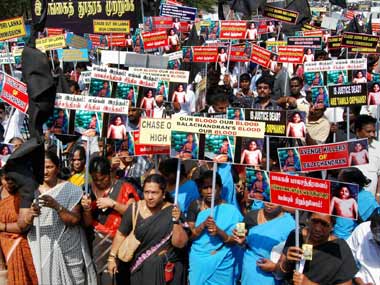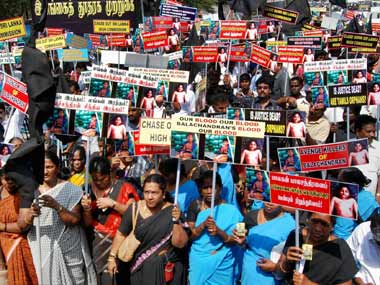New York: Sri Lanka faces its second US-sponsored resolution in as many years at the ongoing UN Human Rights Council in Geneva. America is very keen on India’s support on this issue since it is a key regional player. New Delhi is also under intense pressure from political parties in Tamil Nadu to back the resolution rebuking Sri Lanka over war crimes. But India’s support for the motion is likely to cause diplomatic tensions with Colombo. The specifics of the pending US resolution remain unknown, but it is expected to once again call on the Sri Lankan government to work towards reconciliation and open up its doors to international monitors. “The resolution will ask the Government of Sri Lanka to follow through on its own commitments to its people,” said US State Department spokesman Patrick Ventrell. “It will build on the 2012 resolution, which called on Sri Lanka to do more to promote reconciliation and accountability.” [caption id=“attachment_647877” align=“alignright” width=“380”]  New Delhi is under pressure to back the UNHRC resolution rebuking Sri Lanka. PTI[/caption] The upcoming US-sponsored resolution is a follow-up to the first resolution titled “Promoting Accountability and Reconciliation in Sri Lanka”, which asked Colombo to investigate if their armed forces committed atrocities against the Tamil Tigers at the climax of the country’s 26-year civil war. It passed in March 2012, with 24 votes in favour, 15 against, eight abstentions. Sri Lanka denounced the process as “arbitrary”. Among the countries that voted in favour of the resolution were the US and India. China and Russia were among the nations that supported Sri Lanka and opposed the resolution. Last week, V Narayanasamy, union minister in the Prime Minister’s Office (PMO), said Prime Minister Manmohan Singh had promised to back the resolution. Despite the Dravida Munnetra Kazhagam (DMK) and AIADMK urging Singh to back the new resolution, there is discomfort within the government regarding the document’s fine print. Not everyone is convinced that outside intervention in the internal affairs of Sri Lanka is productive “When accountability comes from within, there is a greater chance of sustainability,” Foreign Minister Salman Khurshid told the Rajya Sabha last week when the Sri Lanka issue was raised by the DMK and AIADMK. “India would much rather like that issues of accountability are kept as sovereign responsibility of a nation and not imposed from outside. Like China, India is opposed to externally imposed solutions on countries,” reported The Times of India. The motion, if successful, won’t legally bind the Sri Lankan government to any policy. In the past, countries have taken a much harder line against Sri Lanka. In 2010 the European Union withheld trade preferences to Sri Lanka over its perceived failure to address human rights concerns. Sri Lanka’s army defeated the separatist Tamil Tigers in May 2009, putting an end to 26 years of brutal civil war but the final phase of that war has been a source of considerable controversy, with both sides accused of war crimes. Experts say thousands of people may have been killed, largely through shell fire by Sri Lankan government troops. Human rights groups estimate that up to 40,000 civilians were killed in the final months of the war. The Sri Lankan government recently released its own estimate, concluding that about 9,000 people perished during that period. Media freedom in Sri Lanka continues to be trampled upon with journalists being assaulted and armed assailants attacking them in their homes. Sri Lanka has dismissed the claims and a large team of Sri Lankan officials and diplomats are lobbying countries to oppose any fresh resolution, saying such a move would damage reconciliation efforts.
America is very keen on India’s support for the UNHRC resolution rebuking Sri Lanka over war crimes. New Delhi is also under intense pressure from political parties in Tamil Nadu to back the resolution. But it seems conflicted for now.
Advertisement
End of Article


)

)
)
)
)
)
)
)
)



